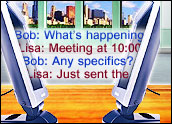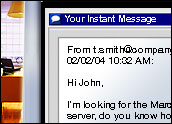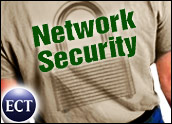
As more corporate users add instant messaging to their arsenal of communications tools, IT and security experts face the challenge of managing, securing and archiving this data.
More than one-quarter of the 4,510 people polled use instant messaging in the office, according to a survey conducted over the summer by Opinion Research for America Online. This represents an increase of more than 71 percent over the prior year, according to Opinion Research.
While instant messaging might be a productivity boon, it also has the potential of becoming an IT manager’s nightmare. As instant messaging use between colleagues, customers and business partners increases, so too will corporate America’s need to ensure the security and safety of these communications.
IMlogic, a privately held Waltham, Massachusetts-based developer, is banking on business’ need to protect itself, comply with regulations and monitor its instant messaging communications. The company created IM Linkage, an enterprise-class instant messaging application system to develop and deploy business-critical applications that leverage multiple instant messaging networks.
IMlogic’s IM Manager enables enterprises to capture the business benefits of instant messaging while mitigating the risks associated with this form of communication. Both solutions are based on the firm’s IMpulse engine, which IMlogic developed in partnership with companies such as Microsoft, AOL, IBM and Yahoo.
The E-Commerce Times recently spent time talking — on the phone, not via instant message — with IMlogic’s founder and CEO, Francis deSouza, who ran Microsoft’s Real-Time Collaboration Group and built Microsoft’s first instant messaging server, Exchange 2000 Instant Messaging. The Massachusetts Interactive Media Council recently named deSouza Entrepreneur of the Year. Here’s what he had to say:
E-Commerce Times: So, who is IMlogic? What market or need do you address?
deSouza: I founded IMlogic when I left Microsoft at the end of 2000, the beginning of 2001. What we do at IMlogic is provide software to companies to help them manage instant messaging use within their company. We help companies manage and secure the instant messaging traffic that exists within their company. It exists because people are either using the public services — like AOL, MSN or Yahoo — or they’re using some of these enterprise service offerings like Microsoft’s Live Communications Server or Lotus SameTime or Jabber, for example.
What companies learned from e-mail is that when you deploy a messaging system, it’s not just enough to deploy the e-mail server or the instant messaging server. You actually need an ecosystem around that server to help make it enterprise class. With e-mail, they went out and bought products from companies like Sybari or HP OpenView or IBM, to actually secure and manage their e-mail traffic, to protect them from viruses, to prevent spam, to provide reporting capabilities, to provide compliance-level archiving capabilities, and we’re being told by the market that IM is going to go a similar way. IT departments are going to deploy their instant messaging network product but they’re also going to need pieces of the puzzle around that IM server. What we do is we provide that.
Our IM Manager product does several things for you. One is it provides you visibility and reporting around instant messaging use in your company. It’ll tell you how much traffic you have; it’ll allow you to tie it to departments or offices. It’ll tell you which networks are being used — you know AOL, MSN, Yahoo, your internal systems — so you can actually plan your network better. It also provides you with security, so it’ll prevent viruses from coming into your company via instant messaging; it prevents spam from coming into your company over instant messaging. It protects you from good stuff leaving your company: It actually can watch to see if somebody’s sending out confidential documents.
The third thing it does is provide you with compliance-level archiving. You can selectively archive instant messaging traffic within your company.
ECT: That is something that’s increasing in importance today with so much legislation revolving around electronic communications.
deSouza: Absolutely. It’s just part of a good records management policy.
ECT: Is IM Manager valuable to companies of all sizes or is it mainly targeted at large enterprises?
deSouza: It’s really distributed. In 2001, the early adopters were in the financial services world — companies like Merrill Lynch, Morgan Stanley, and the New York Stock Exchange. But then it broke very horizontally after that. We have the world’s largest auction site, we have the world’s largest PC manufacturer, but we also have one of the leading baseball teams in the country as a customer, we have one of the symphony orchestras as a customer, we have the security agencies in the United States as customers, so it’s really gone large and small. It’s broken down by geography. We have one of the largest grocery chains as a customer. And then it’s also grown internationally. Our international customers include companies like Scottish Power.
ECT: Is any customization involved?
deSouza: It’s pretty much out of the box. We have over half a million seats deployed across over 400 companies.
ECT: Are sales increasing exponentially each year?
deSouza: Absolutely. I think one of the things we’re beneficiaries of is instant messaging usage continues to grow at a very rapid pace. We’re tracking behind that. Once you start using instant messaging within your company, you really start to appreciate that you need security around it.
ECT: Is that one of the main concerns — security? Or are potential clients more concerned about regulatory issues?
deSouza: It’s security around protecting themselves from malware — you know, viruses and worms — and then it’s the archiving requirements that regulations have put on them.
ECT: And how long, typically, is the sales cycle?
deSouza: It depends. It can be a few months. It can be less than a month, depending on the size of the company.
ECT: What is the pricing for IM Manager? How do clients generally justify the purchase?
deSouza: I think you should plan on about [US]$20 a user, in that range. With security, there are some good ROI calculators around. What is the cost of getting hit by a virus? That’s typically how we see companies doing the ROI analysis.
ECT: How have some of the recent rulings affected companies and the way in which they monitor and archive electronic communications?
deSouza: There are a number of rulings that have impacted companies. Some of them are industry-specific. In the financial services industry there has been legislation such as SEC 17A4 that talks to financial services companies about the need to keep records of communications between broker/dealers and their customers. There are also regulations like Regulation FD, which is the Fair Disclosure regulation, which talks about keeping records of communications between investor relations groups and the public markets and analysts in publicly traded companies.
There’s also the Sarbanes-Oxley regulation that requires you to keep track of communications of a certain type. All those also apply to instant message. That was one of the big Aha’s that happened this year: They’re not just talking about letters and faxes and e-mails. They are also covering relevant communications that happen in instant messaging.
ECT: And is that specifically spelled out in these regulations?
deSouza: In some of them it is. Even the New York Stock Exchange issued a memo to its members emphasizing that instant messaging was covered by those regulations.
ECT: No fudge room there, right?
deSouza: No. It’s pretty clear!
ECT: So what do you envision for 2005?
deSouza: I think we’ll continue to see growth because people are coming to grips with the fact that instant messaging is a core part of their communications toolset, and that — as with any other core part — they need to have management and security around it. As instant messaging becomes more pervasive and more accepted as a business tool, I think the demand for IM Manager will continue to grow.
ECT: Are there any misconceptions about instant messaging or IM Manager?
deSouza: I think the biggest myth we hear is that some companies don’t believe they have instant messaging within their company. They will say, “Nope, we didn’t deploy the IBM or the Microsoft product. I think it’s a toy for teenagers.” We still hear that.
We have this free download off our Web site — www.imlogic.com — called IM Detector, and that gives you a free report of how many users you have on AOL, MSN and Yahoo. That’s a big eye-opening event for a lot of IT departments.
ECT: So if you’re a company that hasn’t done a formal rollout of an IM solution, it might be wise to go to your site and do the free download?
deSouza: I think you’ll be surprised!
ECT: Ignorance doesn’t cover you under Sarbanes-Oxley, does it?
deSouza: No, it doesn’t.
ECT: You said that was the first, biggest misconception. Any others?
deSouza: The second one is that sometimes you might say, “Okay, I do have it but it’s not being used for business purposes. People are just using it for office cooler chat or to talk to their families.” But that’s a big myth. I think people have found it to be useful as part of the way they do business, so they are conducting business over instant messaging, which means a lot of your intellectual property is happening, is being created over instant messaging, and you need to have a policy for that. You need to say: “Look, if important decisions are being made over IM, maybe we should keep track of those. Maybe we should give people access to their own personal archives of instant messaging.” Say you make a price commitment to a customer or a delivery commitment — that’s binding, but you may not have a record of it.
ECT: Do you have any direct competitors in this space?
deSouza: There are no big companies in this space. I think it’s still early for them. I think the obvious players — whether they’re big security players or the big e-mail archiving companies — are choosing to partner. We’re partnered with EMC. We’re partnered with Veritas on the e-mail archiving side. We’re partnered with Symantec, Sybari, McAfees of the world on the security side.
You’ll probably have to stay tuned around the end of 05, 06, for any of the big guys to get into this space.
ECT: Do you have any new products coming out soon?
deSouza: In early December, we announced an IM Virus Threat Center. We’re going to create a threat center on our Web site. It’s a knowledge base of the threats out there for instant messaging. We’ll assess how serious they are and help you protect yourself from them.
ECT: Is it just for your clients?
deSouza: No, it’s for everybody. We’re partnered with Symantec, McAfee and Sybari on this.
ECT: You mentioned you founded IMlogic a few years ago, and before you worked at Microsoft you founded another company, correct?
deSouza: Yes.
ECT: So, what are the pros and cons of founding your own business versus working for a huge company like Microsoft?
deSouza: It’s very different, obviously. I actually really enjoyed working at Microsoft. It’s a very well-run company. In a start-up environment, there’s an awful amount of creativity. There’s a big impact you can see on a day-to-day and a week-to-week basis. I just enjoy creating things. It’s a wonderful feeling.
ECT: Did you garner any management or personnel skills while at Microsoft?
deSouza: Lots! Microsoft’s a great shipping machine. They know how to ship software products. It was a great learning experience for me.
ECT: And what do you think they learned from you?
deSouza: (laughs) You’ll have to ask Bill that.
ECT: What are some of the challenges facing IMlogic as the company goes forward?
deSouza: We’re scaling very quickly, and that always has operational challenges like making sure you’re hiring the right people, making sure you have the right, and enough of, the infrastructure to support them as you bring them on, and that you can scale internationally. Now we have operations in Asia, in Europe. Putting all that in place is a challenge.
ECT: It’s a nice one to have, though?
deSouza: It is. I prefer it to the alternative.
ECT: How do you sell your solutions?
deSouza: We have a network of resellers, but we also have our own sales force, both inside and outside.






















































Social Media
See all Social Media